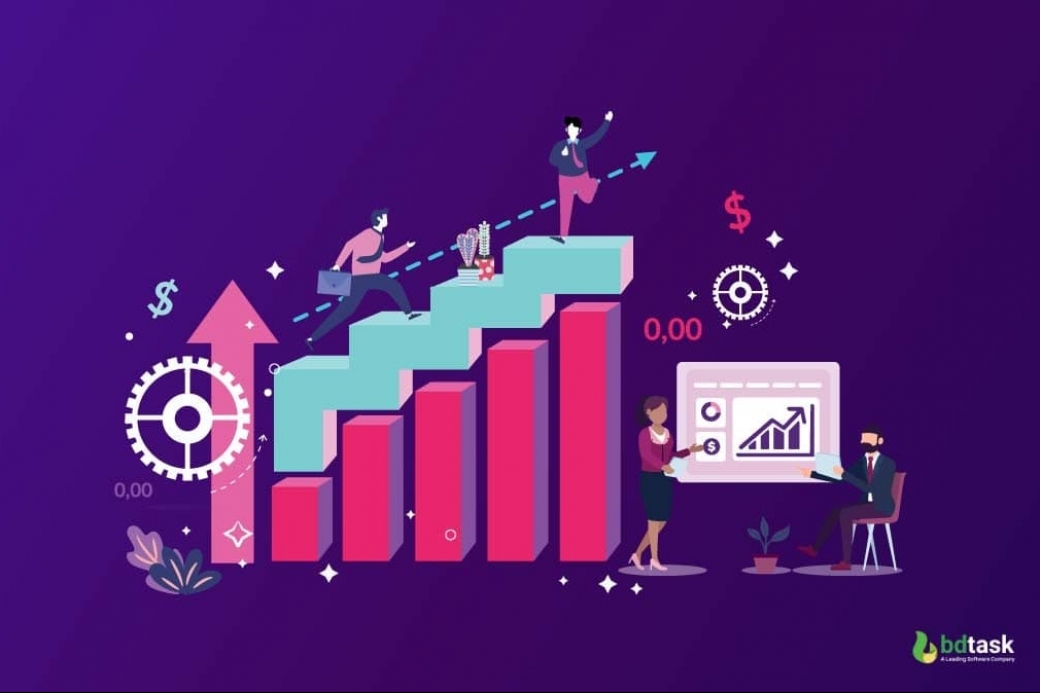Grow Business with Enterprise Resource Planning (ERP) Systems

Enterprise resource planning (ERP) systems are used by organizations looking to manage their business functions within a centralized and integrated system. ERP software is commonly used by companies working within the supply chain to help keep track of all the moving parts of manufacturing and distribution. However, ERP can be utilized by a number of different industries including those in healthcare, nonprofit groups, construction, and hospitality. Organizations needing to manage their staff, customers, and inventory can all rely on ERP benefits.
ERP stores all entered data into a single database, allowing all departments to work with the same information. Additionally, all this data can be organized, analyzed, and made into reports. ERP systems bring together customer management, human resources, business intelligence, financial management, inventory, and supply chain capabilities into one system.
More Money Saved
Although many vendors have introduced flexible pricing in recent years, ERP packages are still a big investment. For many, the large costs alone can make it seem unlikely that the program would end up saving your organization any money at all. But once you get past the sticker shock, it’s easier to see how ERP systems can provide an excellent ROI.
First, ERP unifies many of the systems that may currently be fragmented in your organization. From product development to accounts payable, your staff will be able to access all the necessary tools for their job from one centralized system.
By unifying systems, you help your staff utilize their time more efficiently. With ERP, users don’t have to hunt down a piece of information across multiple systems. With the central database, information is much easier to retrieve. Moreover, your organization saves money with ERP by eliminating the need for users to be trained in several systems. This not only reduces the amount of money spent on training but also reduces the logistical effort involved. Instead of scheduling several training sessions with several different vendors, you only need to communicate with one another.
Check Out: The Best ERP Software for Small Businesses
Improved Collaboration
The features of ERP applications can vary slightly depending on the program you are using, but generally, all systems improve collaboration in some way. As mentioned before, the centralized database is an integral part of what makes an ERP unique. With this database, you provide your company with a single source of truth to work from. This reduces any errors brought on by working with the incorrect data, further reducing costs.
Moreover, a central database reduces any hesitation or stalling during projects, since all team members have access to the company-wide data they need. Additionally, there’s no need to merge information across various systems or sources. Because all of the data is compiled, stored, shared, and accessed through a single system, there is no concern about how accurate, complete or secure the data files are.
This isn’t as easy to say if perhaps your team is entering the same client information over and over again into several different systems. Without an ERP, you invite human error into your processes when it could easily be avoided.
Better Analytics
A central database of information also aids in improving your analytics and reporting. Since ERP records and stores all the data users input, it makes for an excellent business intelligence tool. As long as your vendor provides strong functionality, ERP software makes it easier and faster for your team to generate various reports. Reports that could take days of research and compilation without an ERP takes just minutes.
Most ERP systems provide a customizable dashboard so executives can see reports when they first log into the system. These reports may include everything from income and expense statements to custom KPIs that offer insight into certain functions. The ability to have access to these reports quickly enables you and your team to make better decisions more quickly. You no longer need to rely on your IT staff to generate the reports that you need. Lastly, reports typically come with access levels, ensuring only relevant staff see valuable company data.
Improved Productivity
With traditional methods, tedious tasks are completely unavoidable. Tasks like generating reports, monitoring inventory levels, timesheet tracking, and processing orders have historically taken employees' hours to accomplish. In addition to taking up time, these processes lower employee morale and open yourself up to human error. After the umpteenth hour of entering the same line of data into different forms, even the best staff members are bound to make a mistake.
If you choose the right solution, an ERP system can automate your most tedious tasks. The database within ERP software eliminates redundant tasks such as data entry and allows the system to perform advanced calculations within minutes. This frees up your team members’ time to do more thoughtful work, increasing your ROI when it comes to labor. From this, ERP increases your organization’s productivity, efficiency, and profitability.
Happier Customers
Managing your customers has never been so important. In our digital age, more and more people are turning to the internet to receive advice on what clothes to wear, what food to eat, and how to live their lives. And with 84 percent of consumers trust online reviews as much as they would a friend, previous customer opinions are more impactful than ever.
The best way to improve customer satisfaction is to provide client-centered goods and services. ERP provides this in a few different ways. First, most ERP systems are equipped with a customer relationship management (CRM) tool or can be easily integrated with one. With an ERP, your CRM has access to data across business functions.
Along with contact information, an integrated CRM can show you details such as order history and billing information. This enables your team to see your clients more holistically to gain a better understanding of their wants and needs. The increased customer visibility helps you formulate your sales strategy for improved lead generation.
Simplified Compliance and Risk Management
As companies grow and do business in different countries, it can be difficult to keep track of all the different regulations imposed on your business. Even local companies need to worry about various environmental, information security, and human resources regulations.
Luckily, many ERP systems are built with these regulations in mind to help you maintain compliance at every stage. Moreover, ERP software provides built-in auditing tools to assist with documenting things like chemical use and tax provisions. This makes it incredibly easy to formulate reports and send them over to the relevant governing body.
Additionally, ERP systems often provide tools to manage risk. This solution’s enhanced reliability and accuracy improve overall financial management since there’s less chance for errors during accounting. Forecasting tools also allow users to predict events when it comes to demand, labor, and budget. With this information in hand, you can create more secure budgets, schedules, and product development plans.
Improved Inventory Monitoring
A major challenge for growing companies is tracking and monitoring their expanding inventory levels. ERP systems utilize barcoding, RFID tags, and serial numbers to keep tabs on your inventory at every stage during the supply chain. These tools help you keep track of inventory levels at different warehouses, which items are in transportation, and which items are on the shelves ready for consumers. The increased warehouse visibility optimizes the pick, pack, and ship process greatly, removing all the guesswork.
Inventory monitoring also bolsters reporting, as tracking technologies provide more accurate numbers. Users can configure custom KPIs to see which products move the fastest — showing greater demand — and which increase carrying costs. With the greater precision provided by ERP, warehouse managers can get real-time data on their inventory to make more accurate business decisions.
Improved Production Planning and Resource Management
Along with managing your inventory, ERP systems also manage to manufacture. ERP provides insight into all manufacturing operations including the shop floor. This enables users to optimize production schedules, equipment, and labor to maximize capacity.
Additionally, ERP manages your Bill of Materials (BOM) and fixed assets. With this software, users can easily create and edit BOMs along with keep track of all previous changes. Fixed asset management allows users to schedule equipment maintenance to reduce unexpected downtime, improving your profitability and supply chain relationships.
Check out: Best Sales ERP Software for Business
Bottom Line
The importance of ERP systems far outweighs the initial cost, time, and effort involved in implementation if you choose the right solution. See our ERP Buyer’s Guide for more information on features and functions, implementation goals, and questions to ask vendors. With enough careful research and thoughtful consideration, you’ll find ERP software uses that provide all the benefits listed above painting a picture of why ERP is important to a company.
Would you like to read: Best ERP Software: Build vs. Buy










